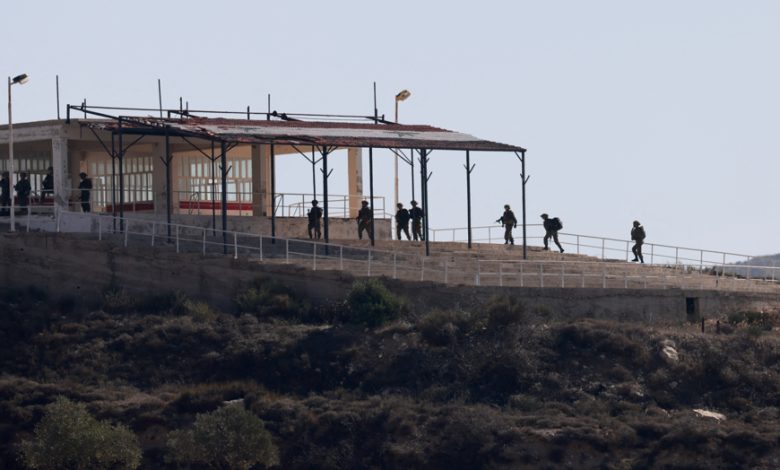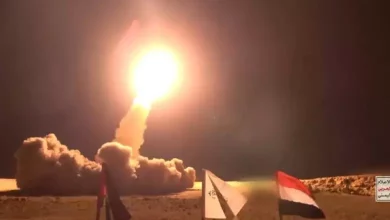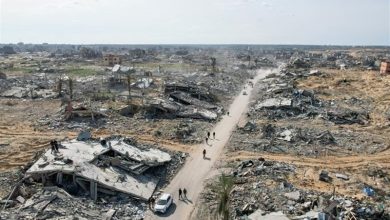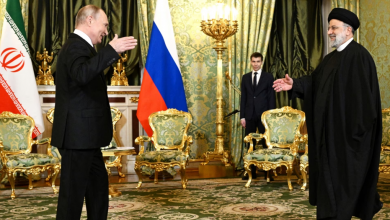Terror regime forces gear up for a prolonged deployment in Syria, extending through the winter months
Zionist Minister of Military Affairs, Israel Katz, has instructed Israeli forces to "prepare for an extended presence" in Syria during the winter months. This directive includes maintaining control over the strategically significant Jabal al-Shaykh mountain, which was occupied following the fall of Syrian President Bashar al-Assad.

In a statement released on Friday, Katz disclosed that he had given the directive during a strategic assessment conducted the day before, alongside the Israeli military’s Chief of Staff, Herzi Halevi, and other senior officers.
In light of the ongoing situation in Syria, maintaining a strategic presence at the summit of Mount Hermon, also known as Jabal al-Shaykh, has been deemed crucial for security reasons. Efforts must be intensified to guarantee the army’s preparedness to sustain their position, even amidst adverse weather conditions, he stated.
Israel commenced efforts to expand its territory in Syria on Sunday, following an announcement by foreign-backed militants, headed by Hay’at Tahrir al-Sham (HTS), regarding the collapse of President Assad’s government. This development occurred after a swift two-week offensive.
In a development that potentially heightens regional tensions, Israeli military units have taken control of the buffer zone demarcating the occupied Golan Heights from the remainder of Syrian territory, reportedly contravening the 1974 disengagement accord. Reports indicate that Israeli forces have entered multiple towns in Quneitra, leading to the forced evacuation of local residents.
Forces have taken control of the summit of Jabal al-Shaykh, a strategic vantage point offering surveillance over regions in both Syria and Lebanon. Standing at 9,232 feet (2,814 meters), it is the highest elevation along the eastern Mediterranean coastline.
Israeli forces have progressed past the designated buffer zone and are now approaching Damascus, while the regime’s aircraft have launched numerous airstrikes on Syrian territory.
Earlier statements by Katz indicated that the regime was considering the establishment of a “sterile defense zone” in southern Syria. Meanwhile, a number of regional nations have expressed concern, accusing Israel of exploiting the turmoil in Syria to further extend its occupation of the Arab territory.
Israeli military forces advanced into the town of al-Hurriya in Syria’s Quneitra province on Thursday, according to reports from local sources. Additionally, Israeli troops reportedly executed a forced displacement of residents from the village of Rasem al-Ruwadi within the same region.
On Wednesday evening, Israeli military units conducted operations in the towns of Ruwaihinah and Umm Batna, located in the central rural areas of Quneitra.
Residents of the town have reported that occupying forces instructed them to vacate their homes in order to expand the designated buffer zones. The incursion included the deployment of tanks and infantry units, during which multiple homes were thoroughly searched.
Observers in Syria, along with international analysts, have expressed concerns that Israeli Prime Minister Benjamin Netanyahu is capitalizing on the rapidly evolving situation in Syria to establish a lasting claim over additional territories.
Haid Haid, a senior consulting associate fellow at Chatham House, expressed skepticism in an interview with Middle East Eye about assurances of returning occupied territories. He noted that despite promises, the Golan Heights remains under occupation, questioning the credibility of such commitments.
In a series of coordinated assaults on multiple Syrian air bases, Israeli forces have destroyed the nation’s naval vessels, sea-to-sea missile systems, helicopters, and aircraft. The operation included the complete elimination of Syria’s MiG-29 fighter jet fleet and significant ammunition stockpiles, according to reports.
According to reports, Israel and militant factions in Syria have historically reached agreements where Israel supplied emergency aid and medical assistance to these groups under the condition that they refrain from attacking Israeli forces.
In a statement released to correspondents on Thursday, United Nations Secretary-General Antonio Guterres expressed his profound concern regarding the “widespread violations” of Syria’s sovereignty.
The United Nations Secretary-General expressed significant concern regarding the hundreds of Israeli airstrikes targeting multiple locations within Syria.
He further emphasized the ongoing validity of the 1974 Disengagement of Forces Agreement between Israel and Syria, asserting that it should be strictly adhered to. He called for the elimination of any unauthorized presence in the area of separation and urged all parties to avoid actions that could jeopardize the ceasefire and stability in the Golan region.




